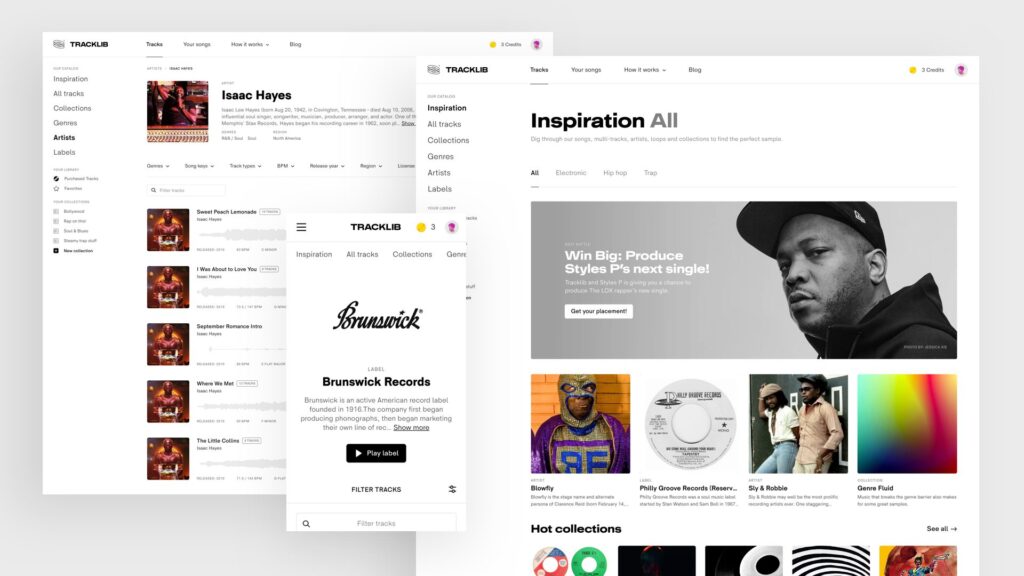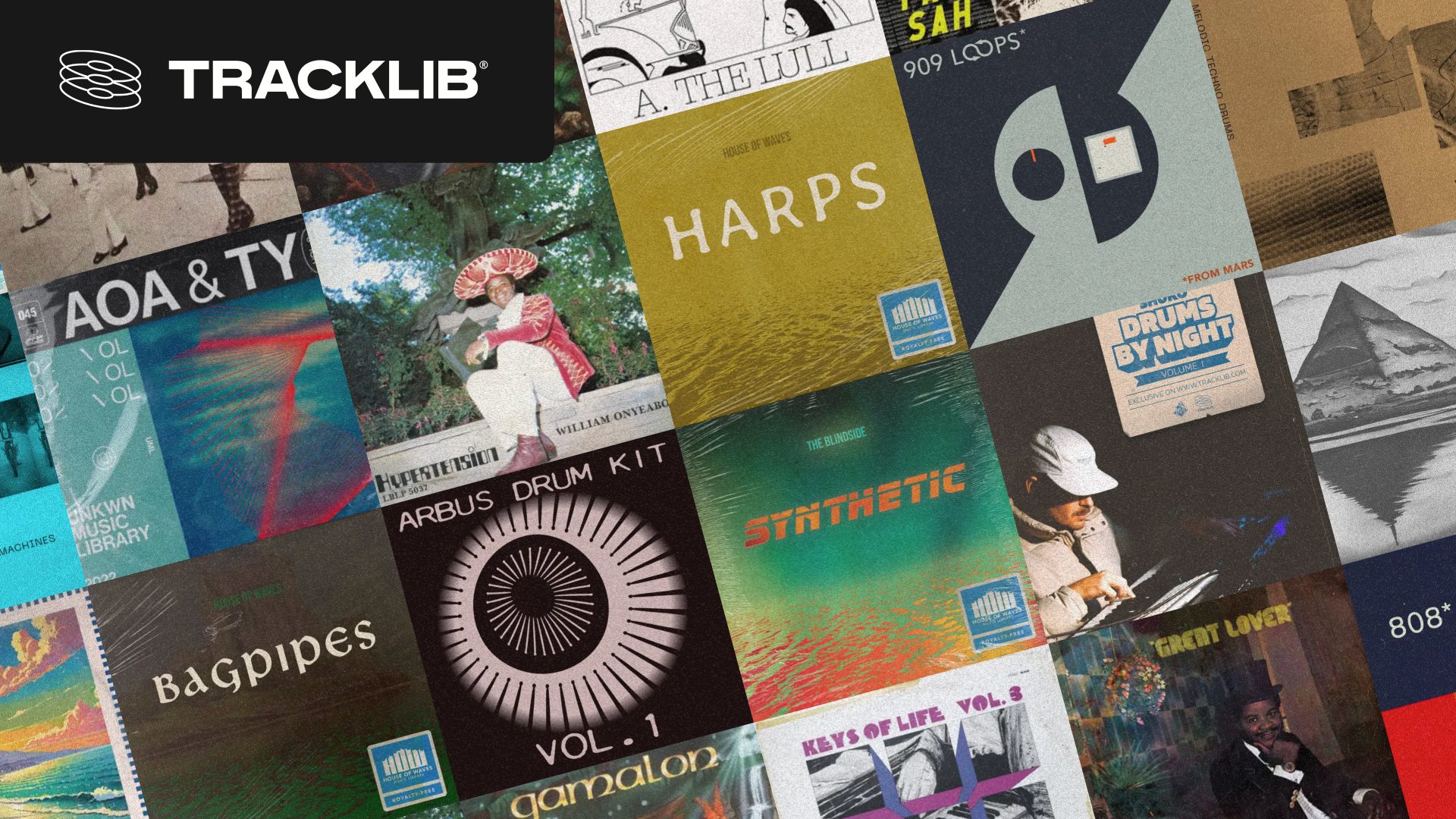Modern music has been transformed beyond recognition thanks to sampling. The act of utilizing a section of audio from an existing song to make a new track, the technique has been used around the world on many of your favorite tunes. While Hip-Hop largely helped popularize this production style, birthing a completely new wave of beatmakers such as Marley Marl, DJ Premier and Pete Rock, sampling is used across different sounds to equally amazing effect. Even the likes of Stevie Wonder, Kate Bush and Brian Eno have sampled!
But it does have a complicated history and many producers and artists have clashed with copyright and licensing laws. Sampling without permission from the track owner can breach the copyright of the original sound recording of what you’re sampling. This can result in serious legal trouble for producers. Even today, sample clearance is still a complex matter and a lot to get your head around. Luckily, platforms like Tracklib are making sampling much safer. A marketplace for copyrighted tunes to use in your music, Tracklib is a game changer in the world of production. It empowers creators to clear samples independently and release tracks safe in the knowledge that your music is legally safe
In this article, we will cover the journey of sampling, the role Tracklib has played and why they’re an important base for producers to excel.
Contents
Sampling and it’s incredible creative history
Contrary to popular belief, sampling goes back as far as the 1940s. The first attempts were made to splice and loop tape by French composer Pierre Schaffer. He developed what is known as musique concrète, recording musical sounds to tape and manipulating them to create beds of sound. This technique grew in use throughout the next 20 years. Jamaican musicians like King Tubby and Lee ‘Scratch’ Perry and German band Can would then begin experimenting with splicing.
Sampling ramped up with the birth of hip-hop in the 1970s and 1980s. It would become a foundation for the new art form. Producers began sampling from Disco, Funk and Jazz records, particularly borrowing drum breaks from past songs. Some notable examples include the Amen break from The Winstons’ 1969 track ‘Amen, Brother.’ It can be heard on Rap tunes like N.W.A.s ‘Straight Outta Compton’ and Jungle tracks like Goldie’s ‘Inner City Life.’ Meanwhile, James Brown’s ‘Funky Drummer,’ with a drum solo by Clyde Stubblefield, has been sampled thousands of times.
As the technique popularized, even more sampling equipment became more readily accessible. Machines like the AKAI MPC, Oberheim DMX and Linn LM-1 empowered producers to elaborate tracks without other instruments, a studio or formal music knowledge. Thus, making it easier for anyone to become a beatmaker overnight. Today, production tools such as Logic, Pro Tools and Ableton have shifted production firmly into the digital age. This has enabled even more creative freedom for producers.

Sampling’s complicated legal history
Of course, sampling has navigated some choppy legal waters in the wake of its popularity. Many producers, artists and record labels have borne the brunt of lawsuits from others for unfair use of existing tracks and audio. Laws around sampling have been established and developed over time, and weren’t always around at the start. But let’s lay out the legal framework of sampling and what you can and can’t do.
When sampling tracks, you need to obtain permission from the owner of the copyright in the music recording you are sampling. These are the owners of both the composition of the recording – the underlying musical work – and the master recording of the song – the actual recorded audio. The copyright applies to the musical notes, lyrics and structure of a song. So, elements like a drum break, guitar riff or vocals.
You also need to get permission from the owner of the work’s publishing copyright. These could be the performers and writers of the song or the record label or entity that released the song. Then, you negotiate the clearing process. This can include getting a sampling license and potentially negotiating an upfront fee or a cut of any royalties – or even a share of your own composition – to sample a work.
In other cases, you could interpolate a track, meaning you are sampling the notes or lyrics of a song instead of the actual recording. This is an incredibly popular form of sampling. A famous recent example is Juice WRLD’s ‘Lucid Dreams’ which interpolates Sting’s ‘Shape Of My Heart.’
Famous sampling lawsuits
There have been multiple occasions of producers facing legal action, or copyright holders suing musicians for a lack of compensation. Famous lawsuits that have shaped the discourse around sampling include the Turtles suing De La Soul for using an unlicensed sample on their album 3 Feet High and Rising in 1989. The case was settled out of court, but at a still early, and fairly lawless, period of Hip-Hop’s relationship with sampling, it laid the groundwork for discourse around sampling and its potential financial impact on artists.
Meanwhile, the songwriter Gilbert O’Sullivan sued the rapper Biz Markie in 1991 after Markie sampled O’Sullivan’s “Alone Again (Naturally)” on the album I Need a Haircut. The verdict ruled that all sampled songs needed approval from the rights holder, changing the course of sampling thereafter.
How Tracklib has changed the sampling game
The world of sampling has long needed a void filled that protects producers and allows them to explore their creativity to the max. One that has all the legal framework in place to let them thrive safely. Tracklib has become that void filler. The service makes sampling and sample clearance fast, easy, legal and affordable for every music producer in the world. It’s so trusted that the likes of Kaytranada, Drake, Kendrick Lamar, Liam Howlett of The Prodigy, Mary J. Blige and countless others world-renowned musicians have used Tracklib to clear samples.
Known as an online record store, its catalog spans over 100,000 songs across genres and decades, ready for you to use. Here, you’ll find anything from 70s Afrobeat to 80s House, a crate-digger’s dream. Tracklib makes the music licensing process quick, easier and cheaper, meaning you don’t have to pay for each individual clearance. As a result, Trackilb creates an unlimited amount of opportunities for music creators at all levels.
If you’re just starting out your production journey, your appetite for new music will be met. Plus, its Loop and Pitch functions lets you make and play chopped loops of any song and adjust its speed. That way, you can experiment with the music you want before committing to it. If you’re more intermediate or advanced, you have access to more obscure tunes to create even more amazing tracks. Not to mention its new Sounds section, where you get access to a huge library of royalty-free one-shots, loops and FX. Everything from drum kits to 808s are available right at your fingertips.
Endless possibilities
Above all else, Tracklib unlocks creative potential. When you can suddenly use an original song as an instrument and know beforehand that the licensing costs are already covered by your subscription, it changes the way you can create. They even have unique stems and multitracks available for some songs so you can manipulate tracks until your heart’s content. With such a vast catalog of music, Tracklib drives deep catalog discovery. This enables you to unearth unheard music and be introduced to new regions and genres. It’s almost like going into a physical record store to find new tunes, and finding records beyond your wildest imaginations. Tracklib is the digital equivalent.
On the financial side of things, Tracklib generates completely new revenues for original artists, producers, songwriters and their labels and publishers when their music is being sampled. Its catalog is filtered by artists and labels, meaning the subscription revenue Tracklib generates go straight to the copyright owners with no fuss. Not only that, but you can also see the breadth of its music collection and the thousands of entities that are represented on the platform.
And the work never stops. Tracklib’s dedicated team of crate-diggers, beat conductors, and loop purveyors are always on hand to scour crates to add the best music to Tracklib’s catalog. They make sure you never run out of music to play, sample and ultimately transform.
Your production adventure starts now
With so much music to dive into, the possibilities for your music are endless with Tracklib. You can let your creativity fly and find your style as a producer in the process. All in the safety of knowing the music you find on the platform is above board and legal to sample. So, be as adventurous as you can, and Tracklib will take care of the rest.
